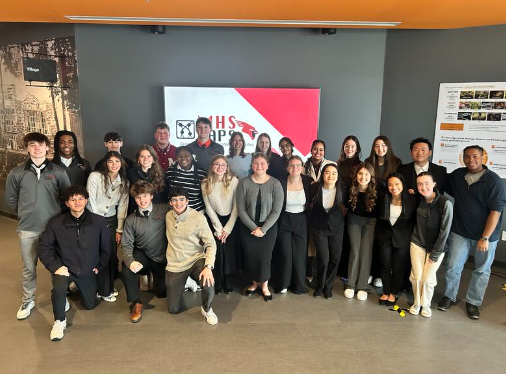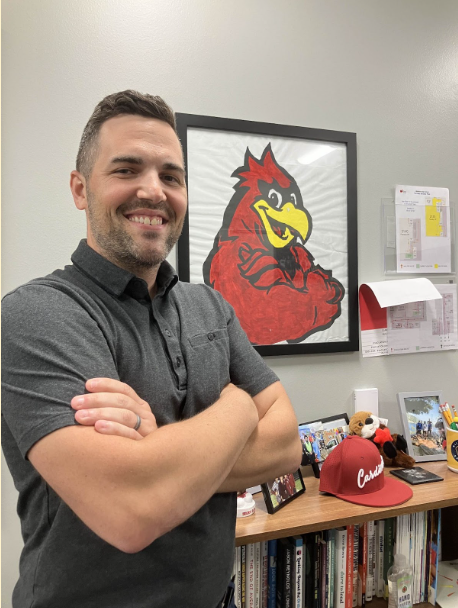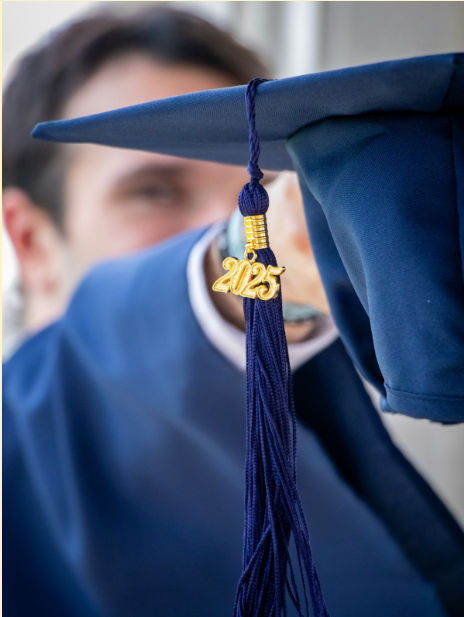The Center for Advanced Professional Studies (CAPS) courses now offered at Middleton High School (MHS)are nationally recognized, innovative high school programs. Unlike regular classroom courses, students in CAPS classes are immersed in a professional setting where they learn about industry standard tools, solve real world problems and work with actual employers while also earning high school credit. CAPS focuses on team-centered, project-based learning, facilitated through collaboration with businesses and mentors to complete projects.
The 2024-2025 MHS CAPS program was separated into three different sections: Career Launch, Business Solutions and Molecular Biology Research & Design. Next year, CAPS will have four different sections: Business Solutions, Scientific Research & Design, Digital Media Marketing and Introduction to Education & Teaching. All CAPS students must also sign up for Communication for Business & Industry to supplement their chosen course.
On Jan. 10, 2025 MHS CAPS student associates, staff, and community members gathered at Fiskars in Middleton to celebrate the successful completion of the inaugural semester. Students presented the projects that they worked on throughout the semester and shared their personal growth experiences.
“I think [CAPS] is probably the best class I’ve taken, that I’ve chosen to take,” said Ibrahim Aldachach, a senior who took Business Solutions. “It’s helped me not only grow as a person but it helped me finalize what I want to do with my life, it’s my style.”
“CAPS is structured differently from regular classes at MHS, taking up two consecutive blocks during only one semester. This format may be unconventional, but allows students to engage in uninterrupted learning.
“It’s a three hour long class, which gives us a chance to do more than any other class. It’s instructor-led, but a lot of the stuff we do is based on you,” said Bennett O’ Connor, another senior in Business Solutions. “But my favorite part of CAPS is being able to have my own timeline and being able to do a lot of stuff on my own instead of sitting in a class and being lectured.”
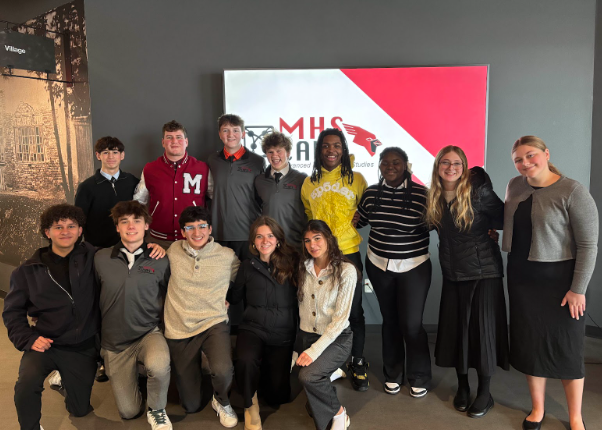
The curriculum for CAPS is unique. Most projects are student-led, with instructors only helping when necessary. Grading, too, is different, with teachers focusing on the skills students will need in a professional setting such as professionalism, collaboration and communication instead of tests and homework.
“This class doesn’t rely on homework and tests to determine your grade, rather it looks at the professionalism that you hold and looks at the growth that you gain over the semester as an individual,” said Archisha Singh, a senior in the Molecular Biology Research & Design program.
Molecular Biology student Justyna Jallah (12) explained more on how the grading system works.
“The rubrics are based on our ‘hireability,” each grading period we fill out self-evaluations based on qualities of professionalism, communication, and science investigations,” said Jallah. “I appreciate that it is based on progress and growth.”
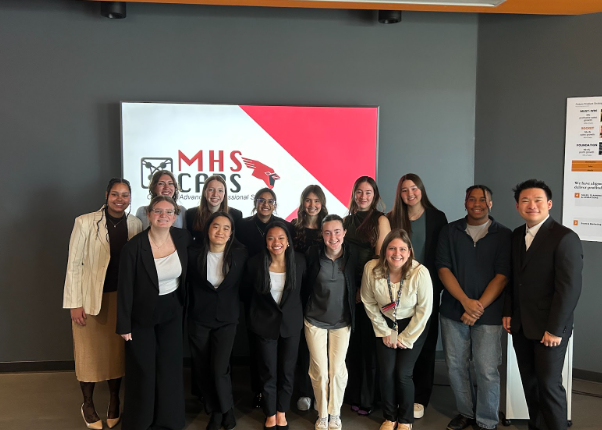
In CAPS Molecular Biology, students were able to plan, produce and create their very own research project. They were then able to conduct their research and collect data to analyze. At the end of the semester, the students’ research culminated in a professional scientific paper.
“CAPS offers things such as site visits, opportunities to collaborate with professionals, and interviews,” said Singh. “My favorite part of CAPS would have to be being able to conduct a research project that is catered towards my interests.”
“My favorite part [of CAPS] is that it’s more than just inside the school’s walls. We get to go out into the world and learn real skills.” Mallory Peters, a junior in Business Solutions, said.
All CAPS classes include multiple site visits and off school-campus trips. Business Solutions students were able to work in the offices of the businesses they were collaborating with, while the Molecular Biology students took multiple trips to different science-based companies.
“We got a full tour of EPIC and got to ask some of their employees questions about their jobs and how their days work,” Fiona Ryan, a junior in the Molecular Biology program said.
Molecular Biology students also visited Thermo Fisher—a science equipment and services developer—sites during the semester, learning more about what the company does and how a career in science may look like.
“We got an inside view of their testing labs, their manufacturing floor and even got the opportunity to go to their new employee training lab and do some hands-on work,” said Jallah. “They’ve given me an opportunity to ask questions and learn more about myself and career path.”
Classes also had a number of guest speakers come into the school over the semester to talk to student associates about their work. Business Solutions students heard from multiple business owners, while Molecular Biology heard from scientists across a variety of fields.
“We also have had a number of guest speakers from a range of backgrounds such as the UW School of Pharmacy, Thermo Fisher and the DNR,” said Jallah. This gives us the opportunity to network with others.”
The CAPS students’ success would not be possible without the teachers’ support during the semester. A lot of work was put in behind the scenes to get the CAPS program up and running. Shane Leadholm, who teaches Business Solutions and Career Launch with Brian Zimdars, explained the process that led to MHS CAPS.
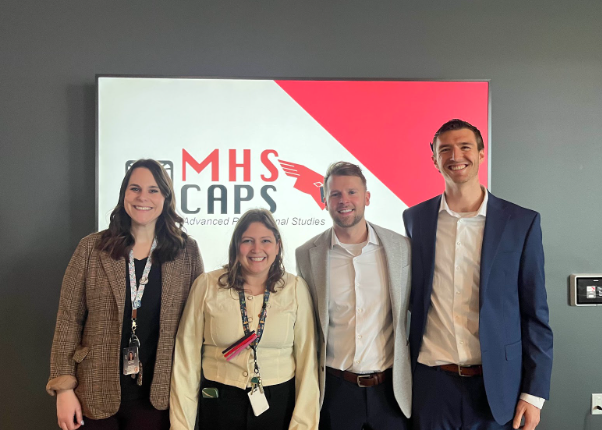
“[CAPS] was several years in the works. We visited schools throughout the United States that have implemented CAPS programs, as well as schools that have implemented [a] kind of profession based learning. So we learned and modeled from some of the best around the country in Blue Valley, Kansas City to Cedar Falls, Iowa to Provo, Utah…So it’s been a lot of planning,” Leadholm said.
However, considering that this was the first year CAPSwas available at MHS, the teachers couldn’t prepare for everything.
“I don’t know what questions I’ll be getting from day to day and minute to minute. It’s hard to plan for class because like, the students plan the class,” Melissa Burgos, who teaches the Molecular Biology class, said.
Elizabeth Slotten, the Communication for Business & Industry instructor, held a similar sentiment.
“I think [the hardest part is] watching people have questions and not answering them,” said Slotten. “Like letting the learning process happen and being more of a witness and on call to the process than a director.”
Leadholm and Zimdars faced other challenges while organizing the CAPS curriculum.
“I would say the biggest challenge to me and the hardest part, is managing all of our projects and communicating with our industry partners,” Leadholm said.
Zimdars said that “[the hardest part of teaching CAPS was] probably setting up the partners and scheduling, because there’s a lot happening, but it’s cool to see how our community partners are flexible. Because we want to be conscious of the time they are giving us and their schedules.”
The teachers also saw significant growth from CAPS students when compared to students in traditional classes.
“I think the biggest thing [difference] is there’s less fear, especially later in the semester, of making mistakes. And like, taking a little bit more risks. [And] a lot more independence in students,” Burgos said.
“Students [in CAPS] are more self-driven. There isn’t as much reliance on me as a teacher to give feedback along the way and the questions I get asked tend to be about guidance,” Slotten said.
“One thing I’ve noticed with CAPS is that students are really driving the work and students are leading. There is a lot of student choice, and students have to take the appropriate steps to manage their projects and manage their workload,” Leadholm said. “As a teacher, I’m giving a little bit less direct instruction and letting students drive some of the work and supporting them and helping facilitate the project.”
“The initiative that students want to take, the ownership, and the willingness to be uncomfortable, ‘be comfortable being uncomfortable,’ and just the pride that students take in their work is cool to see, they’re proud of what they’re doing.” Zimdars said.
The CAPS teachers themselves also learned more about the intricacies of teaching the course this semester.
“I’m learning patience,” Slotten said. “I’m seeing the really cool success in my students in this class and kind of my role in helping that and I’m trying to find how I can replicate that in my other classes… It’s reconfirming for me that learning isn’t linear.”
“[CAPS is] kind of reshaping my philosophy on teaching a little bit. I’m trying to let students really drive a lot of the work. I found that now in some of my other teaching practices and roles…[I’m] trying to give students the space to lead and make decisions, and not necessarily tell them what to do or what to think, but let them make those decisions for themselves.” Leadholm said.
For Zimdars, CAPS has “helped rejuvenate, just [my] passion for teaching and knowing that students are really strong and they can do a lot of things and we can continue to push them and they exceed expectations.”
The CAPS program may be different from the traditional classes most students at MHS are familiar with, but the change in pace and curriculum has been met with excitement from CAPS students, who commend the class. Those indecisive about what classes to take next year should consider putting CAPS on your course selection sheet.



